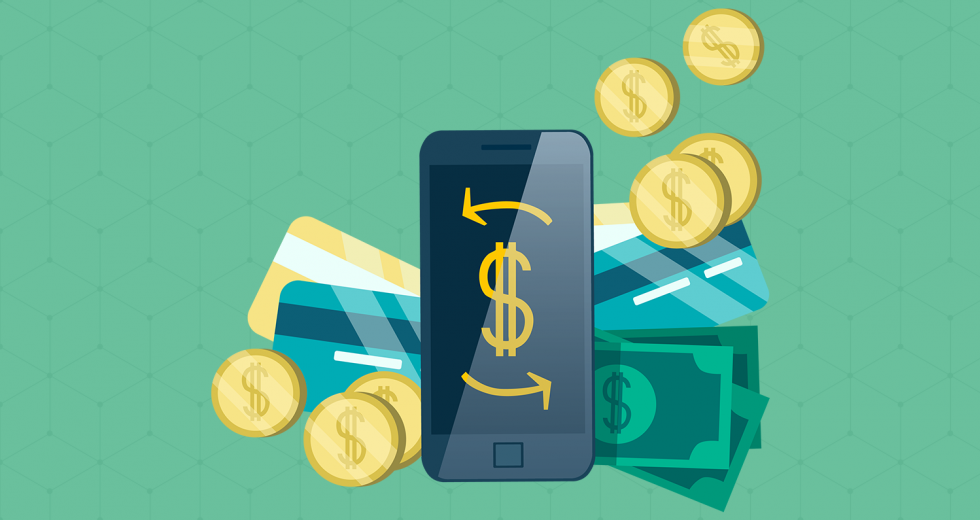It’s clear that we’re addicted to our phones. How bad is our craving? The average person picks up their phone 1,500 times per week, according to one study by the marketing agency Tecmark. Given that we spend so much time with the tiny screen, why not make it productive? Thanks to a growing pool of financial apps, we can now review our budgets, tweak our investments and work toward retirement — all while waiting in line for a coffee.
Acorns
When you were a kid, you put your loose change into a piggy bank and then, eventually, all those nickels would add up. That’s the logic behind Acorns: Once you link your checking and credit card accounts, it rounds up every transaction to the nearest dollar, then it automatically pours that change into an investment account. So if your bagel costs $1.14, Acorn zaps 86 cents (from your checking) into whichever investment portfolio you select. Clever concept, slick execution, and it nudges healthy investing behavior. Fees: $1 per month for accounts with a balance under $5,000; 0.25 percent per year with a balance of $5,000 and over.
Mint
Too obvious? Maybe. But Mint has spawned so many knock-offs for a reason. As PC Mag says, “Mint is hands-down the best personal finance software.” Once you link all your checking, savings and investment accounts, Mint will put everything in perspective. It shows your net worth, spending patterns, recurring fees that you might overlook — it even offers advice on where to cut back. It captures every transaction. It’s more than just an app; it’s like a personal trainer for your wallet.
Venmo
A friend owed me $40. “Here, I’ll Venmo it to you,” she said. “Um…what’s Venmo?” I wasn’t one of the cool kids. I soon found out that Venmo is essentially what would happen if PayPal had a baby with Facebook. You have a newsfeed that shows who of your friends are exchanging money (honestly I’m still not sure why this is useful) — and can send perky emoticons along with cash (☺+ $). It’s easy to roll your eyes, but then again, the most important feature of a cash-swapping app is that other people are using it — so its very popularity, in and of itself, is a killer feature. (Honorable mention: Snapcash, which pairs with Snapchat.)
Expensify
Here’s an app that’s tailored to the freelancer, employee or business owner who needs to track expenses. All those paper receipts that you keep track of? Gone. With a feature called “SmartScan,” you snap a photo of the receipt and then (if you choose) give it a category and merchant, and designate whether it’s reimbursable. It can also track the hours that you’re billing and, in its glitziest feature, the app synchs to your phone’s GPS to track “distance covered,” in case you bill for mileage.
Stash
Another app that nudges you to invest, this one offers $5 trades. When you sign up, Stash will ask a series of questions to get a bead on your risk appetite. As an investor, are you conservative, moderate or bold? Would you rather “go slow and steady” or choose “a bit of Buffett?” Or if you want to invest in eco-friendly companies, you can pick the “Clean & Green” portfolio. Stash will likely disappoint power-investors who want the full arsenal of stocks and EFTs, but it’s catnip for first-timers.
A budget app for people who hate budget apps, Level Money features a cheeky orange interface that just screams “We’re trying to appeal to millennials!” Level Money should, in fact, appeal to millennials. Like Mint, the app synchs all of your accounts to give you a financial snapshot, then it helps you create a realistic budget from the ground up, even giving a concrete number called “spendable” of what you can spend right now. (Alas, it always seems smaller than I would like…)
Robinhood
Yet another investment app that’s aimed squarely at millennials, Robinhood has just one simple hook, but it’s a good one: $0 stock trades. Not $5. Not $15. Nothing. No account minimums. The design is clean, zippy, intuitive, and it does seem to make trading fun. (Maybe too easy and fun. As New York Times tech columnist Farhad Manjoo tweeted, “Why’s this a good idea? People shouldn’t buy individual stocks. Why make it easy/cheap/mobile?”) But the appeal is undeniable, which is why the app’s investors range from Google Ventures to Jared Leto to Snoop Dogg. And if you can’t trust Snoop Dogg for financial advice, who can you trust?
Check back next week for our feature on millennials and financial management. Sign up for our newsletter and we will email you when it’s online.




Comments
Check out Moneyspire it's a great finance manager also http://www.moneyspire.com